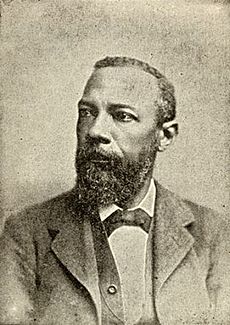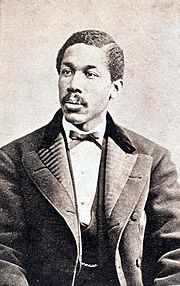Jacob C. White Jr. facts for kids
Jacob "Jake" C. White Jr. (born 1837 – died November 11, 1902) was an important American teacher, thinker, and civil rights leader. He was born to a successful family and received the best education available to African Americans at the time. White became a key figure among Philadelphia's black leaders.
He was the first black man in Philadelphia to become a school principal. White is best known for his work at Roberts Vaux Consolidated School. From 1864 to 1896, he improved the school and became a top leader in urban education in Philadelphia. Besides his school work, White was also big in sports. He helped start the Philadelphia Pythians, one of the first black baseball teams. After his friend and fellow activist Octavius Catto died in 1871, White became the main civil rights leader in the city. He stayed active in his community until he passed away in 1902.
Contents
Jacob White Jr.'s Life Story
Early Years and First Jobs
Jacob White Jr. was born in 1837 to Jacob White Sr. and Elizabeth White. He grew up in Jenkintown, a mostly white area near Philadelphia. His father was a barber and doctor who was well-respected. Jacob White Sr. also owned a shop that sold goods made by free black workers, avoiding products made by enslaved people.
White Sr. was a smart businessman who made money from real estate. He was a leading figure among Philadelphia's wealthy black community. He strongly supported education and was an abolitionist, meaning he worked to end slavery. Jacob Jr. learned these passions from his father.
Jacob Jr. first went to Lombardy Street Public School. In 1853, he joined the Institute for Colored Youth (ICY). This school, started by the Quakers, focused on high moral standards. It taught subjects like Latin, Greek, and trigonometry. While there, White wrote essays showing his deep understanding of black society and human thoughts. In 1855, he spoke to Governor James Pollock about African American citizenship. That same year, White became secretary of the Banneker Institute, a student group for scholarly talks. He was the only one to graduate from the ICY in his class on May 6, 1857. Everyone liked him, both students and teachers.
In 1858, White started teaching at the ICY's school for boys. He became even more interested in math. He gave talks on math as part of the Banneker Institute's math committee. In his free time, he became a very good chess player. His excellent math skills led him to other business roles. He worked as an agent for newspapers like the Anglo-African (1860–1861) and Pine and Palm (1860–1862). In 1861, he worked for the Haitian Bureau of Emigration. This job allowed him to help free black people move to Haiti from New York. Because of these different jobs, White became quite wealthy at a young age.
White wanted to be a school administrator. He was the top choice for principal of the Roberts Vaux Consolidated School. In 1864, he became principal, making him the first black person in Philadelphia to hold such a job. The Vaux school was first in a poorly aired church basement. Under White's leadership, it moved to a new building and its student numbers tripled. White also helped end segregation in Philadelphia's school system. This included Central High School and Girls' Normal School becoming integrated. White was happy with his achievements and retired in June 1896.
The Philadelphia Pythians Baseball Team
While teaching at the ICY, White worked closely with Octavius Catto. Catto was an important civil rights activist and a long-time friend of White's. They shared similar friends and ideas about education. Both men had played cricket at the ICY. They believed baseball could help African Americans push for social change and show they deserved full citizenship.
In the spring of 1866, White and Catto started the Philadelphia Pythians. This baseball team was mostly made up of men from the Knights of Pythias group. Catto was a strong hitter and played shortstop and second baseman. He was the team's leader on the field. White became the team's secretary. He was in charge of scheduling games, planning events, and keeping track of player statistics. Soon, Pythian games became very popular in the black community.
On September 3, 1869, the Pythians played in the first recorded interracial baseball game. "Colonel" Thomas Fitzgerald, a respected baseball figure, suggested the idea in his newspaper. Their opponent was The Olympics, Philadelphia's oldest baseball club, which started in 1832 playing town ball. The Pythians lost the game 44–23. However, The Philadelphia Inquirer newspaper said the team "did very well, especially their outfielders, who made several very fine catches."
White and Catto tried to join white sports groups, but they were not successful. Even though they were denied, the Pythians became friends with the Philadelphia Athletics team. The Athletics often let the Pythians use their field. One of their members, Hicks Hayhurst, even spoke up for black baseball teams to be included. The Pythians had several good seasons. But Catto's murder in 1871 stopped the team's activities. They reformed later for the 1887 season of the National Colored Base Ball League.
Other Important Work
After Catto's death, White became a very important leader for Philadelphia’s African-American community. He was a member of groups like the National Equal Rights League, the Pennsylvania Abolition Society, and the Social, Civil, and Statistical Association of Pennsylvania. He often served as a secretary for these groups.
In 1849, White's father, Jacob Clement White Sr., started Lebanon Cemetery. This was one of only two cemeteries in Philadelphia for African Americans at the time. By 1889, the cemetery was very crowded and not well kept.
In June 1895, White was chosen as the president of the board for the Douglass Memorial Hospital. Under his leadership, he secured state money for the hospital in 1898. He got these funds from Alexander K. Pedrick of the State Senate. After getting the money, White stepped down as president but stayed on the board until his death on November 11, 1902.
 | Roy Wilkins |
 | John Lewis |
 | Linda Carol Brown |



